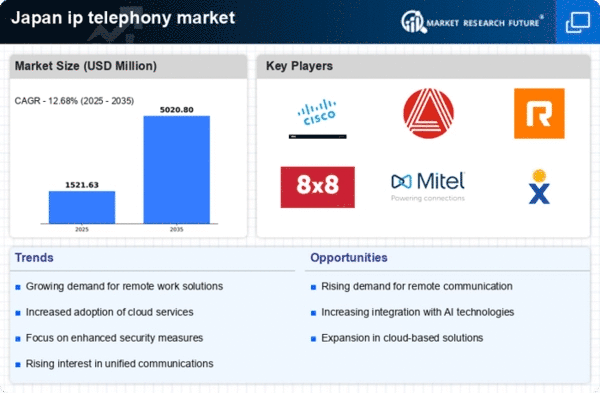Growing Focus on Customer Experience
The growing focus on customer experience is significantly influencing the ip telephony market in Japan. Companies are increasingly aware that effective communication plays a crucial role in customer satisfaction and retention. As a result, there is a heightened demand for IP telephony solutions that offer advanced features such as call routing, interactive voice response (IVR), and customer relationship management (CRM) integration. Market analysis indicates that businesses investing in enhanced communication tools can improve customer satisfaction scores by as much as 25%. This emphasis on customer experience is likely to drive further adoption of IP telephony systems, as organizations strive to create seamless and responsive communication channels with their clients.
Cost Efficiency and Operational Savings
Cost efficiency remains a critical driver for the ip telephony market in Japan. Businesses are increasingly recognizing the financial benefits associated with transitioning from traditional telephony systems to IP-based solutions. The potential for significant savings on long-distance calls and maintenance costs is particularly appealing. Reports suggest that companies can reduce their communication expenses by up to 40% by implementing IP telephony systems. This financial incentive is compelling, especially for small and medium-sized enterprises (SMEs) that are looking to optimize their operational budgets. As organizations continue to seek ways to enhance profitability, the ip telephony market is likely to see sustained growth as more companies make the switch to cost-effective communication solutions.
Rising Demand for Remote Work Solutions
The ip telephony market in Japan is experiencing a notable surge in demand for remote work solutions. As organizations increasingly adopt flexible work arrangements, the need for reliable communication tools has intensified. This shift is reflected in the market data, which indicates that the adoption of IP telephony solutions has grown by approximately 30% in the last year alone. Companies are seeking to enhance collaboration among remote teams, leading to a greater reliance on IP telephony systems that offer features such as video conferencing and instant messaging. This trend is likely to continue, as businesses recognize the importance of maintaining effective communication channels in a hybrid work environment. Consequently, the ip telephony market is poised for further expansion as more enterprises invest in these technologies to support their remote workforce.
Technological Advancements in Communication
Technological advancements are playing a pivotal role in shaping the ip telephony market in Japan. Innovations such as artificial intelligence (AI) and machine learning are being integrated into communication systems, enhancing functionalities and user experiences. For instance, AI-driven analytics can provide insights into call patterns and customer interactions, allowing businesses to optimize their communication strategies. The market is projected to grow at a compound annual growth rate (CAGR) of 15% over the next five years, driven by these technological enhancements. Furthermore, the introduction of 5G technology is expected to revolutionize the way IP telephony services are delivered, offering faster and more reliable connections. As these advancements continue to unfold, they are likely to attract more businesses to adopt IP telephony solutions, thereby propelling the market forward.
Regulatory Support for Digital Transformation
Regulatory support for digital transformation initiatives is emerging as a key driver for the ip telephony market in Japan. The government has been actively promoting the adoption of digital technologies across various sectors, which includes encouraging businesses to upgrade their communication systems. Initiatives aimed at enhancing digital infrastructure and connectivity are likely to facilitate the growth of the ip telephony market. Furthermore, compliance with new regulations regarding data security and privacy is pushing organizations to adopt more advanced communication solutions. As businesses align with these regulatory frameworks, the demand for IP telephony systems that meet compliance standards is expected to rise, thereby fostering market growth.
















